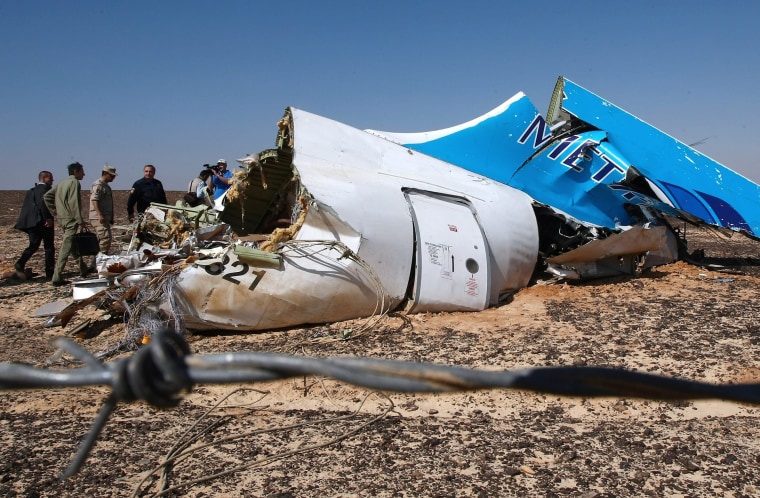Six days after the Metrojet plane crash in Egypt, the families of victims are still searching for answers about what caused the deaths of 224 people, mostly Russian tourists. Here’s what we know so far.
What are the most likely causes of the Russian plane crash?
Officials, experts and NBC News sources agree that some kind of explosion or structural failure caused Flight 7K9268 to break up in midair some 20 minutes into its journey from resort town Sharm el-Sheikh to St. Petersburg.
Who believes it was an act of terror?
U.S. and British officials say intelligence reports indicate that a device placed on the Airbus A321 likely caused the explosion — but that conclusive statements are premature.

“We cannot be certain, but it looks increasingly likely that this was the case,” British Prime Minister David Cameron said Thursday. He added that information suggested it was “more likely than not” that a bomb was on the plane.
A U.S. official said investigators are looking at the possibility that an explosive device was planted on the plane by ground crews, baggage handlers or other ground staff at the Sharm el-Sheikh airport before takeoff.
However, the official stressed that it's too early to conclude that for certain that terrorism was to blame.
Senate Intelligence Committee Chairman Richard Burr said Thursday that anyone saying it was a bomb may have “walked a little further out on the limb” without letting the investigation take its course. “The only thing that’s certain today is that there was a catastrophic event that happened at altitude,” Burr said.
What evidence is available so far?
Nothing has been made public, but investigators have the wreckage and information from the flight data recorder, one of the jet’s “black boxes.”
The other “black box” — the cockpit voice recorder — is “partially damaged” and “a lot of work is required in order to extract data from it,” according to Egypt’s aviation ministry.
Egypt said Thursday no evidence so far had been found to back up the bomb theory. "The investigation team does not have yet any evidence or data confirming this hypothesis," aviation Minister Hossam Kamal said in a statement.
Related: ISIS Bomb May Have Downed Russian Jet, U.S. Officials Say
Experts say the layout of the wreckage points to a midair breakup.
The clean separation of the rearmost tail section — which landed away from the rest of the plane — has led to speculation that the aircraft may have suffered an explosive "decompression," possibly linked to a 2001 repair job after the plane’s tail scraped along a runway and suffered “serious damage.”
However, puncture holes in parts of the fuselage — and the detection of a heat flash by an American infrared satellite — point to a fiery explosion.
Greg Feith, a former investigator with the National Transportation Safety Board and an NBC News air-crash expert, said the infrared satellite data is likely a strong piece of evidence. But there are many places to find clues on the ground, he said. That includes determining whether there are shrapnel wounds on the victims' bodies, searching plane parts for explosive residue and signs of an internal explosion, and examining the nature of burns marks on the wreckage.
Has anyone claimed responsibility?
A local group linked to ISIS quickly claimed it had downed the plane in response to Russia’s recent air strikes against Islamist militants in Syria.
But U.S. and other officials and experts have dismissed this claim, saying local militants in Sinai do not appear to have the weaponry capable of striking a passenger jet flying at 31,000 feet.
Related: Probe Turns Toward Who Had Access to Jetliner
ISIS issued a fresh claim of responsibility Wednesday via social media, but again did not provide evidence.
Is Egypt safe?
Fears of a security lapse appear to focus on Sharm el-Sheikh’s airport rather than the resort itself.
Britain on Wednesday advised against all but essential travel to the Sinai Peninsula. It suspended flights, stranding thousands of vacationers until security measures at the airport were improved and inspected by its own officials. German airline Lufthansa also announced it was no longer flying to the destination.
British officials said the decision to halt flights was “very much based on a range of pieces of information, some of which are intelligence, some of which are from the investigation.” Late Thursday, they announced plans to begin flights out of Sharm later in the week.
Have there been diplomatic consequences?
Signs of an international rift over the investigation were growing Thursday, as both Egypt and Russia said Western statements indicating a possible terrorist cause were premature.
Russian foreign minister Sergei Lavrov and Egyptian foreign minister Sameh Shukri spoke by telephone. "Both sides noted (it was) counterproductive to try to draw conclusions about the causes of the tragedy, (before) the outcome of the investigation,” their offices said, according to a news release from Russia.
The Kremlin also said that Russia president Vladimir Putin had told Britain’s Cameron by phone that it was important that assessments of the possible causes of the crash be based on information from the official investigation.
Egypt’s pride and its tourism industry have been deeply wounded by the fallout from Saturday’s crash. It has much to lose if a security lapse emerges the primary cause.
If it was a bomb, what happens next?
Russia is expected to react quickly and militarily if its citizens emerge as innocent victims of a backlash against Moscow’s intervention in Syria. It is likely to use the incident as an excuse to deepen its role against ISIS in the region.
If ISIS was able to plant a bomb on the plane, "it's a real game-changer for the region," demonstrating that at least some of ISIS' grandiose boasts about its capabilities are true, said NBC News national security analyst Kevin Baron, executive editor of security analytics company Defense One.
